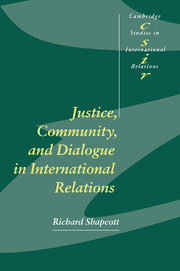Book contents
- Frontmatter
- Contents
- Acknowledgements
- Introduction
- 1 Beyond the cosmopolitan/communitarian divide
- 2 Community and communication in interpretive theories of international relations
- 3 Emancipation and legislation: the boundaries of conversation in poststructuralism and the critical theory of IR
- 4 Philosophical hermeneutics: understanding, practical reasoning and human solidarity
- 5 Philosophical hermeneutics and its critics
- 6 Towards a thin cosmopolitanism
- Conclusion
- Bibliography
- Index
- CAMBRIDGE STUDIES IN INTERNATIONAL RELATIONS
2 - Community and communication in interpretive theories of international relations
Published online by Cambridge University Press: 22 September 2009
- Frontmatter
- Contents
- Acknowledgements
- Introduction
- 1 Beyond the cosmopolitan/communitarian divide
- 2 Community and communication in interpretive theories of international relations
- 3 Emancipation and legislation: the boundaries of conversation in poststructuralism and the critical theory of IR
- 4 Philosophical hermeneutics: understanding, practical reasoning and human solidarity
- 5 Philosophical hermeneutics and its critics
- 6 Towards a thin cosmopolitanism
- Conclusion
- Bibliography
- Index
- CAMBRIDGE STUDIES IN INTERNATIONAL RELATIONS
Summary
To celebrate diversity is necessarily to refuse to treat others as ‘other’. It is to be aware of a moral duty to be obligated to others … In One world/Many worlds, others cannot be ‘other’. They may be different – but not cast as exclusion and inferiority … The challenge is … to work with the necessary reciprocity of connections between peoples able to speak on equal terms.
Recent interpretive developments in IR theory have generated a variety of alternative accounts of community to those witnessed in the cosmopolitan/communitarian divide. In their own ways, constitutive theory, poststructuralism and critical theory have all emerged to challenge the framework with which moral debate in IR is discussed. Although there are many differences between them common to these approaches is a hermeneutic or interpretative understanding of the subject matter of IR and of moral questions especially. It is this dimension which provides the resources with which they are able to move beyond the deficiencies of the cosmopolitan/communitarian divide and resist the ‘devastating choices’ it presents ‘between being human or being a national citizen and between being an autonomous individual or a participant in a social community’. It is the essentially hermeneutic dimension of these approaches which encouraged them to develop accounts of community emphasising the importance of recognising particular concrete others and their communities while simultaneously developing universalist approaches to moral life.
- Type
- Chapter
- Information
- Publisher: Cambridge University PressPrint publication year: 2001
- 1
- Cited by



